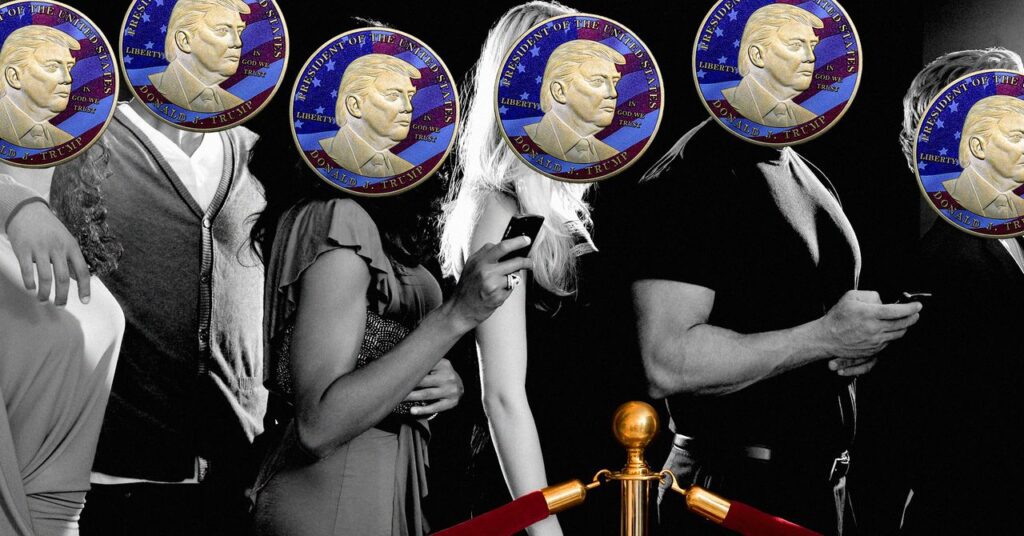A VIP Seat at Donald Trump’s Crypto Dinner Cost at Least $2 Million
VIP investors with the usernames Top and ivo sold 200,000 (worth almost $2.7 million) and 427,568 (worth almost $5.7 million) ahead of the deadline, respectively.
Trump first announced his crypto coin on January 17, three days before his 2025 inauguration. He pitched it as a memecoin, a type of coin used almost exclusively for financial speculation. Because memecoins do not generate revenue, nor have any underlying business model, their price tends to fluctuate wildly with swings in public sentiment toward the person, meme, or concept they are based upon.
In the days after trading began, the 20 percent of TRUMP coins released into circulation surged in value to $14 billion. On paper, Trump’s net worth had increased by tens of billions of dollars almost overnight.
The value of the coin has since dropped by more than 80 percent from its peak. But when Trump announced the dinner on April 23, it prompted another trading frenzy, causing the price of the memecoin to surge. As market intermediaries, Fight Fight Fight and CIC Digital likely made hundreds of thousands of dollars in trading fees.
Since launch, critics have cast the TRUMP memecoin as an unethical “money-grab”—an abuse of Trump’s office for the sake of self-enrichment. They have also expressed concern that the coin could be used to discreetly transfer wealth to the Trump family. By making a large investment and driving up the price of the coin, foreign powers and other politically-motivated actors could try to curry favor with the president, the argument goes.
In establishing an explicit quid-pro-quo—a large investment in exchange for access to Trump—the dinner rekindled those fears. “He is granting audiences to people who buy the memecoin that directly enriches him,” said Democrat senator Jon Ossoff in a town hall meeting on April 25.
The identities of the investors who won a seat at the gala dinner are largely unknown. The largest holders include investors going by the usernames Woo, REKT, GAnt, and CASE. The White House and the event organizers did not respond when asked whether the attendee list will be made public.
However, other investors have chosen to reveal their identities, seizing upon the competition as a branding opportunity. The second place holder, MeCo or “MemeCore,” asked users on X to send $TRUMP to their wallet to boost their ranking, promising a full refund at the end of the contest. “See you guys at Trump’s Gala,” added Rudy Rong, chief business development officer at MemeCore, who comes from a billionaire Chinese family.
In Congress, Democrat lawmakers are attempting to push through legislation that would prevent elected officials from releasing their own memecoins, to offset the risk that these coins could facilitate bribery or open the door to foreign influences. Though the MEME Act stands little chance of being written into law because of the Republican congressional majority and the strength of Trump’s hold over his party, it signals growing discontent over the president’s involvements in cryptocurrency.
“It provides a cloak for payments from bad actors to elected officials and their family,” Democrat congressman Sam Liccardo, who introduced the MEME Act, told WIRED. “The point is that those who are benefiting may include individuals who do not have America’s best interests at heart.”

